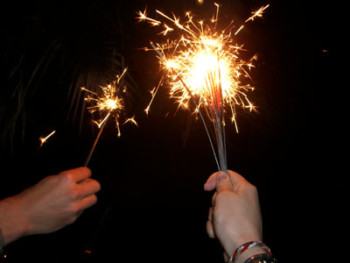Summer is synonymous with barbecues, parades and fireworks displays. But along with all the festivities are plenty of visits to emergency rooms – especially during July.
Thousands of people are injured every year from fireworks. Take care and leave the big fireworks to the professionals.
Sparklers
Every year, young children can be found along parade routes and at festivals with sparklers in hand, but they are a lot more dangerous than most people think. Parents don't realize they burn at about 2,000 degrees – hot enough to melt some metals. Sparklers can quickly ignite clothing, and many children have received severe burns from dropping sparklers on their feet.
Bottle Rockets
These small rockets are attached to a stick, lit by a fuse and typically fired from a bottle. Teens have been known to have bottle rocket wars, firing them at one another and causing chest, head and eye injuries.
Firecrackers
Firecrackers are designed to explode on the ground. They are often linked together by one long fuse and explode in a series. They are designed to be very noisy, but they also can cause burns and other serious injuries.
Roman Candles
Roman candles eject multiple exploding shells from a tube the user holds in his or her hand. There have been numerous reports of children losing fingers, severe burns and other injuries, which are sometimes caused when the device gets jammed.
Two Words About M-class Fireworks
Just don't.
You hear them go off every year: M-80s, M-100s, even M-250s. The unmistakable explosions associated with these devices can rattle the windows of homes for blocks. They are produced illegally and without quality control, have short fuses and cause hundreds of extremely severe injuries each year.
If They're Legal
If fireworks are legal to buy where you live and you choose to use them, be sure to follow the following safety tips:
- Never use fireworks while impaired by drugs or alcohol
- Never allow young children to handle fireworks
- Older children should use them only under close adult supervision
- Anyone using fireworks or standing nearby should wear protective eyewear
- Never light them indoors
- Only use them away from people, houses and flammable material
- Only light one device at a time and maintain a safe distance after lighting
- Never ignite devices in a container
- Do not try to re-light or handle malfunctioning fireworks
- Soak unused fireworks in water for a few hours before discarding
- Keep a bucket of water nearby to fully extinguish fireworks that don't go off or in case of fire
- Better yet, grab a blanket and a patch of lawn, kick back and let the experts handle the show.

